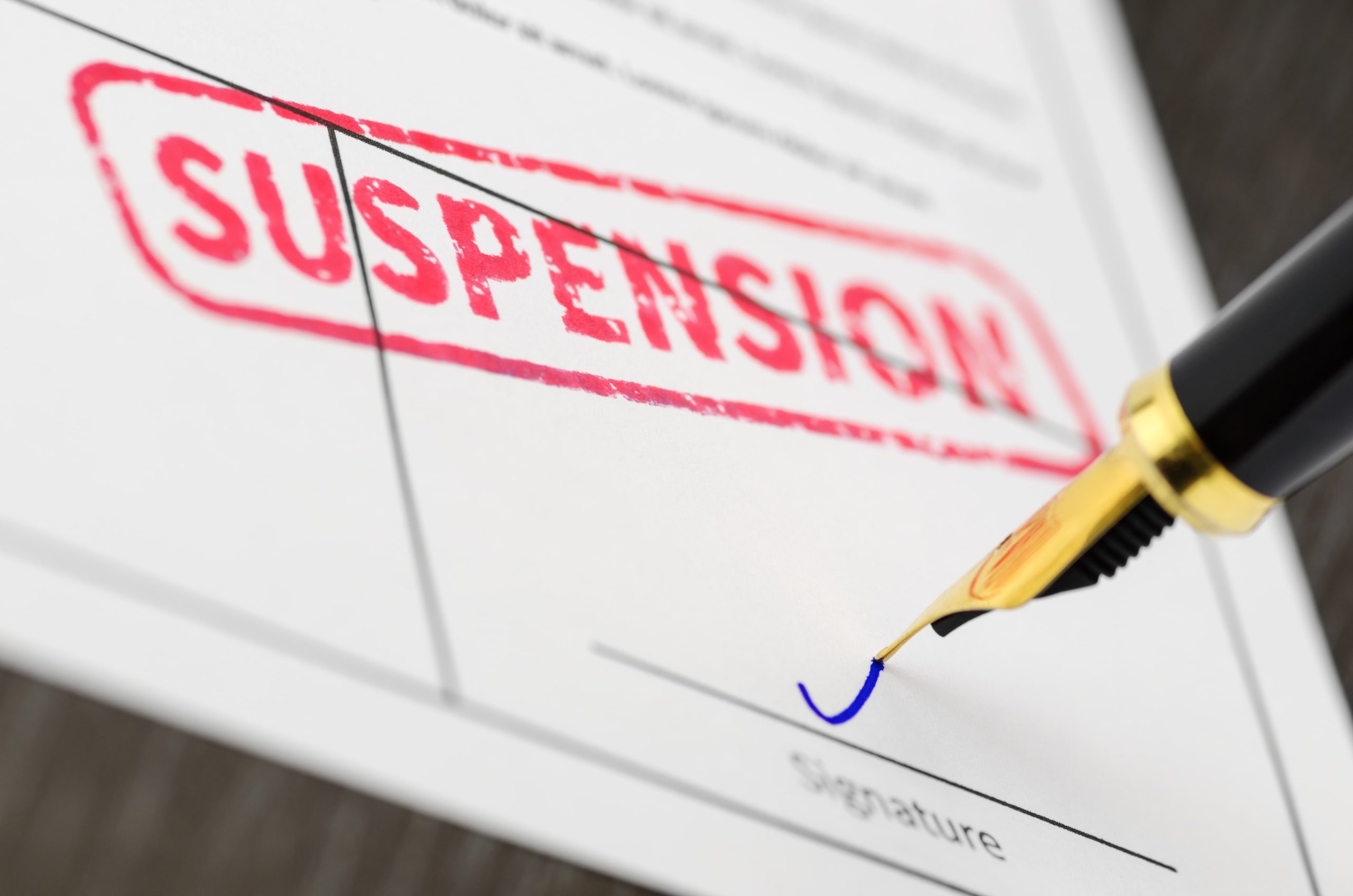BLOG
Managing misconduct | When is it safe to suspend?
Written by Angela Carter on 12 July 2024

When dealing with employee misconduct, it is sometimes appropriate to suspend an employee with full pay while an investigation into the allegations is carried out.
However, the decision to suspend should never be taken without proper thought. All too often, employers rush to suspend employees without a legitimate reason, even when the allegations are minor.
Why are knee-jerk suspensions a problem?
Suspending an employee when it is not reasonable to do so – or suspending them for longer than is necessary – could be considered a breach of the implied term of mutual trust and confidence. This can lead to the risk of constructive dismissal, where the employee feels forced to resign due to the employer’s conduct.
Additionally, if you suspend an employee with a protected characteristic (such as age, race or sex) but not others in similar circumstances, they may be able to argue that that they have been discriminated against.
Potential legal issues aside, hasty suspensions can also damage the employee’s reputation and have a negative impact on the workplace, as other employees might perceive the treatment as unfair or overly harsh, resulting in lower overall morale and diminished trust in management.
It is therefore crucial to thoroughly assess the situation and consider all alternatives before deciding to suspend an employee.
Do you need support?
Speak to us for an honest, no obligation chat on:
0345 226 8393 Lines are open 9am – 5pm
Case law: is suspension a neutral act?
Over the years, Courts have continued to remind employers that when investigating allegations of misconduct, suspension should not be adopted as a matter of routine.
One such case involved a teacher who was suspended due to her alleged use of force in three incidents involving two challenging pupils. She resigned and brought a claim for breach of contract.
The High Court noted that the letter confirming the employee’s suspension stated: “The suspension is a neutral action and is not a disciplinary sanction. The purpose of the suspension is to allow the investigation to be conducted fairly.”
Ultimately, however, the Court held that suspension is not a neutral act, as it “changes the status quo from work to no work” and “casts a shadow over the employee’s competence”. It concluded that the suspension was adopted as a default position, taken as a knee-jerk response, and breached the implied term of mutual trust and confidence. The fact that the teacher resigned on friendly terms did not undermine or negate this.

So when is suspension appropriate?
You should not suspend every employee who is facing allegations of misconduct. Suspension should be reserved for cases of gross misconduct or very serious disciplinary issues in which the employer believes that:
- The employee’s continued presence at work poses a risk to the organisation, other employees or clients;
- There is a risk that the employee could hinder the investigation (for example, they could tamper with evidence or intimidate witnesses); and/or
- There is a significant breakdown in the working relationship between the employee and their manager or team.
Examples of where suspension may be appropriate include:
- Cases where an employee is accused of physical violence against a colleague, posing a direct threat to workplace safety.
- Cases where an employee is accused of discrimination or harassment against a colleague.
- Situations involving allegations of serious fraud or theft, where the employee’s presence could allow them to alter or destroy crucial evidence.
- Instances where a severe conflict has arisen between the employee and their manager, making it impossible to maintain a functional working relationship.
Things to consider before suspending staff
When weighing up whether to suspend an employee, it is crucial to consider:
- The nature and severity of the allegations of misconduct. Again, only the most serious allegations such as fraud, violence, or significant breaches of company policy will justify suspension – it should not be used in response to minor infractions.
- Whether suspension is necessary and you have reasonable grounds to do so: Assess whether the employee’s presence could hinder the investigation, pose a risk to others, or disrupt workplace operations. If not, suspension may not be justified.
- How long the investigation will last: Suspension should be as short as possible and should be kept under review.
- Alternatives to suspension: Could you reassign the employee to another team or have them work from home while the investigation is underway? It is important to ensure that the alternative role could not be considered humiliating or perceived a demotion.
- The practical impact of the absence on your business: In smaller businesses, it may be a significant financial burden to pay the suspended employee while also paying for cover if no other employees have the capacity or the ability to absorb their duties.
There is also specific statutory advice for school staff, which says that suspension should not be a default option and should only be considered if there is no reasonable alternative.
If you do decide to suspend...
Hold a meeting with the employee. During the meeting, explain:
- The reasons for the suspension;
- The nature of the allegations of misconduct that need to be investigated;
- The likely duration of the suspension;
- What they can and can’t do while suspended;
- What the next steps are; and
- What the potential outcomes of the investigation could be.
It is important to reiterate to the employee that suspension is not disciplinary action and should not be interpreted as meaning that the outcome of the disciplinary procedure is predetermined. All of this should be confirmed in writing.
Note that employees have no statutory right to be accompanied to a suspension meeting but do check that there is no contractual right to be accompanied.
When announcing the suspension to others, be careful not to imply that the employee is being disciplined or is guilty of misconduct. Managers will often provide a vague reason for the employee’s absence, i.e. they are away for personal reasons.
3 top tips for suspending staff safely
Always treat suspension as a last resort after considering all other options.
Clearly communicate that the suspension is not a disciplinary sanction.
Keep the suspension as short as possible and regularly review its necessity.
Related Content
Why not give us a call?
Given the risks involved, it is always safest to speak to a specialist before suspending staff. Our Employment Law experts can help you to weigh up the appropriateness of suspension and guide you through the disciplinary process step by step, including drafting any documents you require along the way. That way, you can handle misconduct fairly and compliantly, without the worry of costly legal mistakes.
For advice and support specific to your situation, get in touch with our team on 0345 226 8393 or request your free consultation using the button below.




